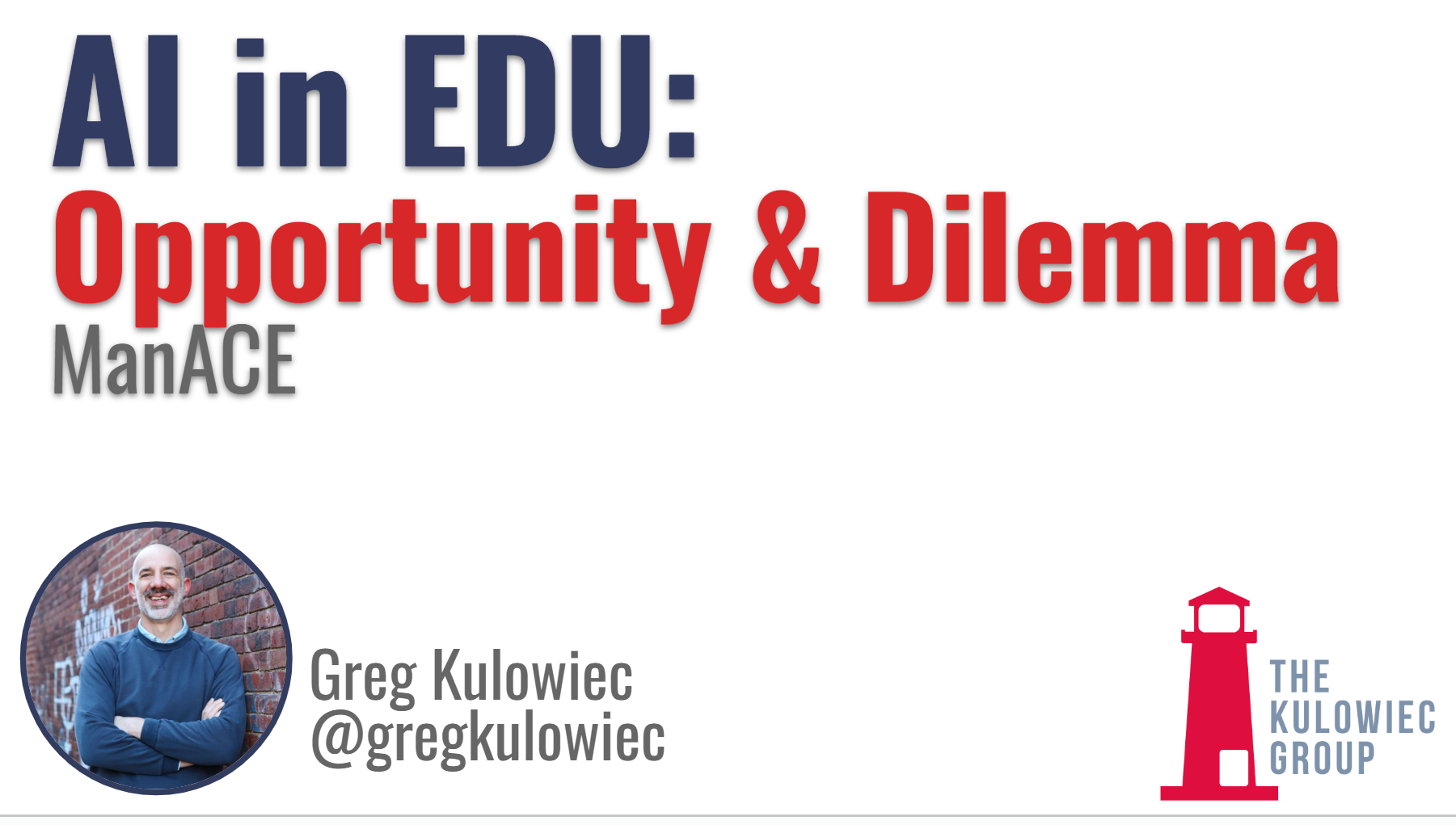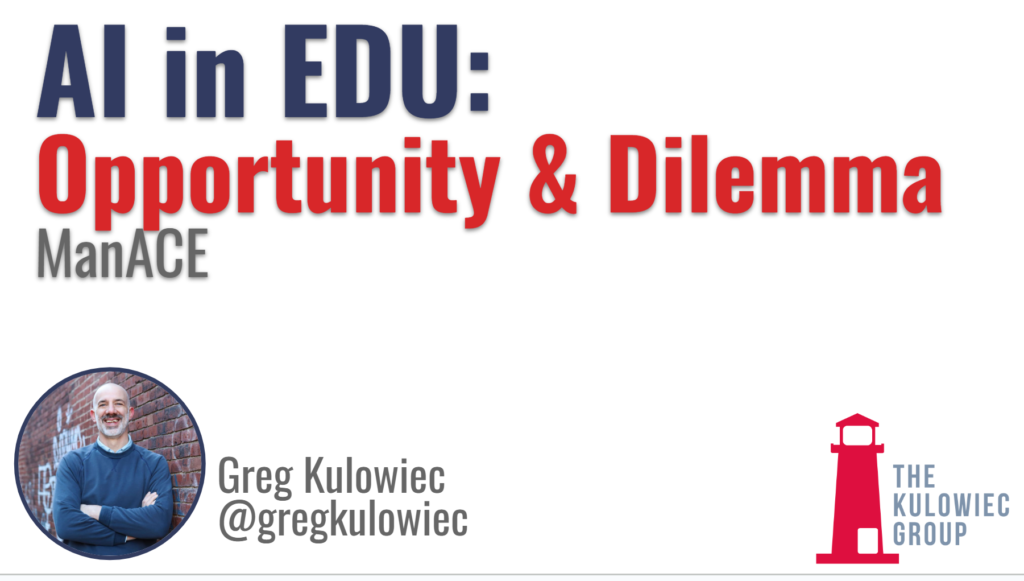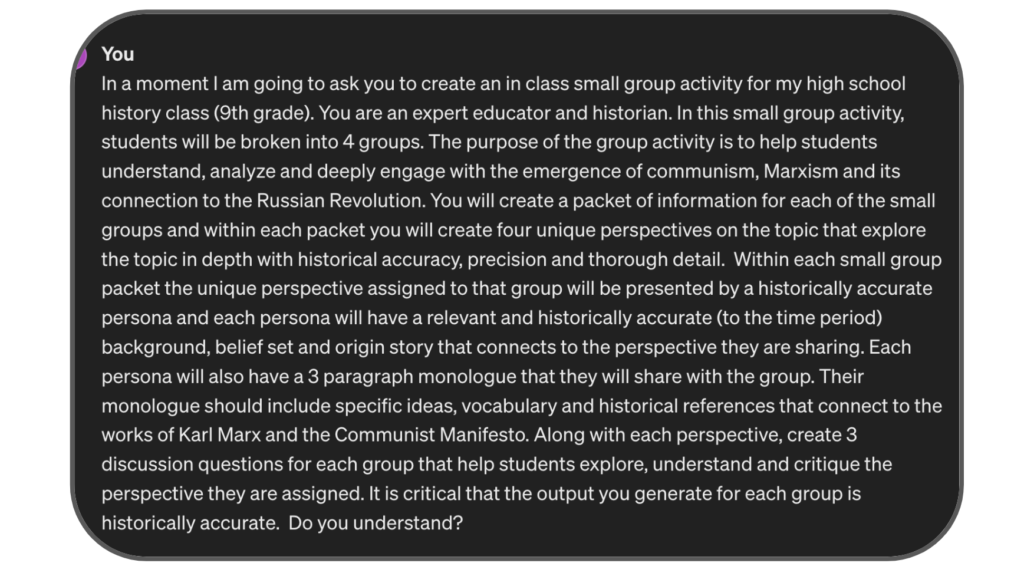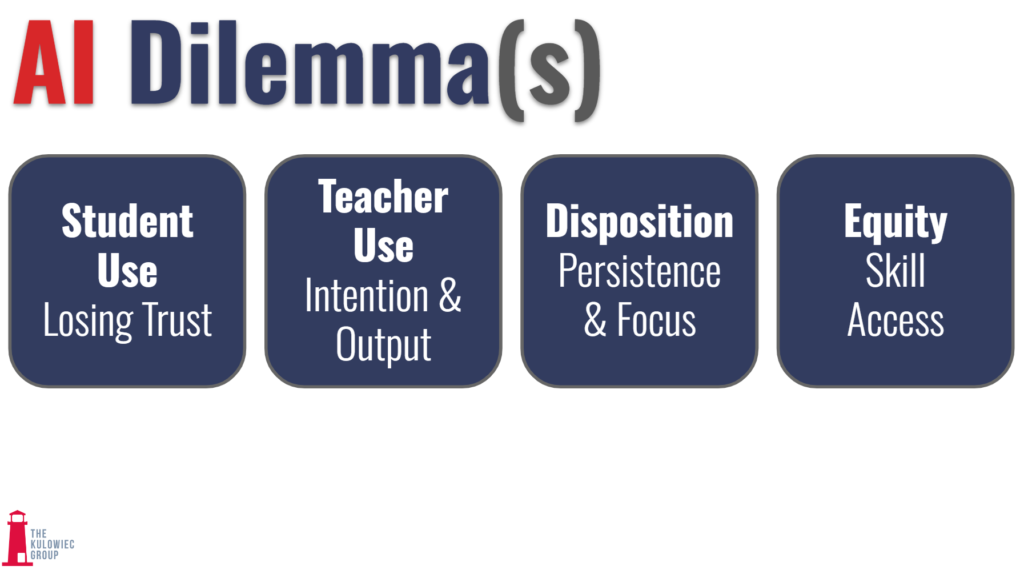AI in EDU: Opportunity and Dilemma

This evening is the ManACE AGM and my last ManACE meeting as president! I will remain on the board in the future in the capacity of past-president but I am thrilled to be welcoming a new senior executive team and celebrating the success our organization had in the 23/24 school year. As part of our AGM, we will be hosting a keynote presentation by Greg Kulowiec titled, “AI in EDU: Opportunity and Dilemma“. This post will serve as my reflection on this learning experience:
When internet connected devices were introduced to classrooms, creating powerful 1:1 learning environments, students and educators were presented with great opportunities to collaborate, create and unlock possibilities otherwise not possible without technology. That shift took place over a decade ago, and education finds itself at another critical juncture as it navigates the rapidly changing education, social and economic landscape created by the emergence of generative AI platforms. Whereas all prior academic technology was adopted, with time for education to prepare and implement, AI arrived swiftly with little time to adapt and prepare. From rethinking relevant skills, to redesigning learning experiences and creating equitable opportunities for all learners, generative AI is impacting all facets of education. How might educators critically reflect to thoughtfully shift their practice with AI? How might schools and districts develop an adaptable framework and culture of learning that leverages AI to enhance the student learning experience? From productivity, to redefining creativity, this one hour keynote talk is designed to help educators, schools and districts develop common language and a framework for the use of AI in their learning environments.

- Any educational technology in the past (cameras, netbooks, streaming, etc) involved adoption that required you to get something and physically bring it to the classroom. It would be purposefully adopted at a macro- or micro-level within the school, school division, or field of education in general. If you didn’t adopt it, then there were no, or limited, negative impacts on your approach to education. AI is impacting education whether an educator adopts it or not.
- It is increasingly embedded in everything
Prompt Ideas for AI as a thought-partner
- In a moment I am going to as for a bit of help with writing a short story. I need to write a short story that is based on a piece of art that I just created. My art is about a sneaker that is shaped like south America. The sneaker is a Jordan 1 and the colors are light pink, navy blue, light blue and red. I don’t want you to write the story for me, instead I just want a bit of help and inspiration. To help me write the story, ask me ten questions that my story could possible be about.
- In a moment you are going to act as a thought partner and will engage in a debate with me about a selected topic. I will take one perspective in the debate and you will take the opposing side, which I will assign to you. The debate will begin with me providing a statement or overview of the debate topic. I will then share my first argument in the debate which will be followed up by our first statement as a reply to my first argument in the debate. Based on my statement, you will create a reply to takes the opposite side of the argument. I will then reply to your statement with my next point and you will provide a subsequent reply. This process of you replying, and only making a statement after I present an argument will continue until I tell you we are done. Additionally, all of your replies will be limited to a maximum of 4 sentences. This will take place indefinitely until I say that the debate is over. In addition to your reply to my argument in the debate, I want to understand why you are making your argument, the reasoning, justification and strategy that you are using. So you will create an additional output with each argument you make called, AI Thought Process. You will create a unique header titled AI Thought Process which will appear under your reply to the debate topic and will include a detailed explanation of your reasoning, justification and strategy Do you understand?

AI is based on a specific data-set. For example, if I ask AI to finish a sentence such as, “peanut butter and…” it will most likely respond with the answer “jelly”.
- does this represent different cultures?
- what about outliers
- is this problematic in situations more complex than sandwich pairings
A helpful resource to better understand the mechanisms behind the large-language models that are powering AI tools is embedded below:
Some potential concerns with student use of AI tools:
- do we still have an opportunity to practice persistence?
- does AI further decrease the need to strengthen focus/attention-based skills?
- are we removing productive struggle?

If AI is the answer, what is the problem? What problem are we solving by putting students in front of AI? If the problem didn’t exist, do we need AI?
Dave Quinn: “From an edu standpoint, I keep coming back to Elliot Washor’s critical questions to learners: “Is this your work, or is this schoolwork?” The threat of AI in EDU seems more significant to the latter less so than the former…”
To learn more about Greg, check out this previous “Follow Friday” post!